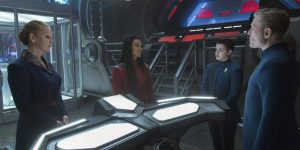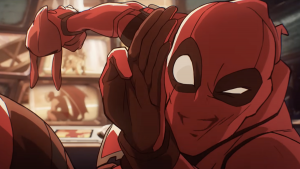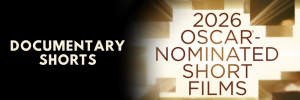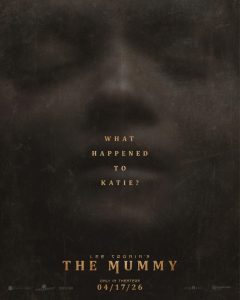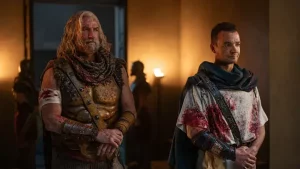
At last year’s HollyShorts Film Festival, I had the opportunity to screen Chris Overton‘s haunting live action short In Too Deep. In its short runtime, it was one of the festival’s standouts capturing not only the grief of a father but the inability to let go. As the short reveals, the father has recently lost his daughter, the devastation destroying his marriage and his own morality in the process. Unable to cope with his grief, he captures a young girl utilizing her physique and AI technology to bring his daughter back to life through generated home videos. Yet, these are not videos of just anything, but rather crafted memories of birthdays and Christmases that death has robbed him of. As he is discovered by his wife, who later aids in his attempt to keep their daughter alive, the ability to sacrifice ones morality in the face of immortality ends the film on a seemingly dooming prophetic note. After watching, Hans Block and Moritz Riesewieck‘s Eternal You, Overton‘s short feels more prophetic than ever.
Premiering at this year’s 40th Sundance Film Festival, Eternal You is as haunting as it is hopeful, the devastating beauty in the potential of eternal life delivered in the hands of individuals who don’t truly understand how it works – or what the everlasting ramifications could be. The film opens with a young woman, a text conversation alternating between herself and a computer. Out of context, it looks like an early form of messaging, yet as the film reveals she is talking to an AI-generated version of her deceased love. The conversation flows seamlessly, the computer answering each of her questions, sometimes with a sense of hope and others with a lasting sense of sadness. As we listen to the young woman describe how she discovered Project December and the healing properties it provides to the bereaved, Eternal You begins to reflect on the dangers of the human psyche and its pairing with AI-generated humans. Over time, it becomes clear that the AI, especially in a world controlled by messaging in some form, has become a tangible entity, the line between reality and fiction blurring the deeper in conversation she gets.
Resurrecting the Dead
Eternal You is effective in creating this opening, initially staying on this one form of AI utilization in bereavement. Based on a simple chat format, it gives a soft introduction to audiences, allowing them to see how the simplest connections to eternal life with our deceased loved ones can become almost living beings before our eyes. It also begins to introduce the question of morality for both creator and the user. As we move forward to Resemble AI, replication of our loved ones evolves to speech, a loved one brought back to life and conversing with family and friends with AI and a synthesized voice. And while some embrace, others are less accepting of this new power of technology – one member of the family in particular dead set against it.
source: Sundance Film Festival
As Eternal You continues through the various companies attempting to utilize AI technology for avatars, VR headsets and legacies, the morality of whether we should do this and how we should proceed is introduced. Starting with a congressional hearing with ChatGPT creator Sam Altman, Eternal You uses clips carefully and selectively throughout the documentary, constantly reminding viewers that this is something that needs our attention – something that needs to be called out. Yet, it is not just the hearing that is presented to audiences in both a case for and against this AI technology, but through the words of the owners of these companies attempting to develop, utilize, and capitalize on their own take of AI bereavement. Yet, where one questions whether this is something he should be doing, many brush off any sense of responsibility, rather than deflecting it to that of the user.
source: Sundance Film Festival
This comes with ominous tones as the documentary takes on a western feel, cowboys charging through unknown territory, willing to discover the next best thing with a sense of lawlessness and freedom. This begins to take on a heavier weight as Eternal You is not afraid to remind audiences that this technology is being delivered to us without a true understanding of how it works – how at times it can seemingly personalize for the user in a way that seems impossible. Even as Sam Altman of ChatGPT talks about the measures being put in place to protect users, he references the need to do it now, while the AI is in a weakened state, quietly laying it out for us all that AI still has the ability to grow and develop so much further than we understand. And with creators working to give AI a nervous system, Eternal You will leave its audience wondering if we have already gone too far.
Conclusion
Eternal You is a riveting documentary that feels both ominous and hopeful at the same time, delivering hope to the bereaved but feeling as a warning to those who might venture into its alluring promises of success and immortality. The documentary does begin to feel as though its is dragging in its final moments, a repetitive sense of dialogue setting in, the film determined have its audience hear its message. Yet, it does little to underscore the documentary. We are entering into the next phase of human evolution, one that has the potential to rival that of the introduction of the assembly line, electricity, computers and social media. Yet, like the ripples of change in the past, the introduction and evolution of AI has the potential to create an unstoppable momentum that could permanently alter the face of mankind – for better or worse.
By film’s end, Eternal You will leave you questioning the introduction of AI, both its ups and downs, and the amount of trust we place into the hands of those who create it. An effective and vitally relevant piece of cinema, Eternal You is both a display of hope and caution that we all need to hear.
Does content like this matter to you?
Become a Member and support film journalism. Unlock access to all of Film Inquiry`s great articles. Join a community of like-minded readers who are passionate about cinema – get access to our private members Network, give back to independent filmmakers, and more.
